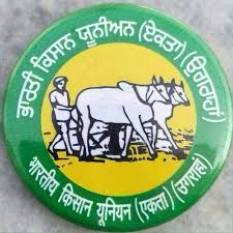NEW DELHI, 30 June 2025: In a dramatic U-turn, the Bharti Kisan Union (Ekta-Ugrahan), Punjab’s largest farmers’ organization, has stepped back from its earlier demand for a legally guaranteed Minimum Support Price (MSP), citing concerns over higher inflation. This reversal has left farmers, experts, and policy-watchers baffled.
BK Ugrahan leader Joginder Singh Ugrahan argued that legal MSP could drive up foodgrain prices, making them unaffordable for India’s poor, and instead called for reducing the cost of inputs like seeds, fertilizers, pesticides, and diesel.
But this line of reasoning has drawn sharp criticism. Jagmohan Singh of BKU (Dakounda) called the move “backstabbing” farmers who have long fought for MSP as a legal right, consistent with the MS Swaminathan Commission’s recommendation for a 50% profit over input costs.
Other farmer leaders, including Jagjit Singh Dallewal and Sarwan Singh Pandher, who spearheaded protests at Punjab-Haryana borders, maintain that legal MSP is the only safeguard for Indian farmers trapped in debt and distress.
Critics argue that expecting a reduction in input costs is a hollow promise. For decades, policymakers and economists have repeated this idea, ignoring that farmers do not control the prices of fertilizers, seeds, or diesel. Moreover, any real reduction would require subsidies, which are politically unpopular due to fears of fiscal deficits.
“The average Indian farm household earns just INR 10,218 a month, according to the last NSSO survey,” an agricultural policy analyst noted. “Most of the country’s poor are themselves farmers. Denying them a guaranteed price is nothing short of economic injustice.”
According to OECD studies, Indian farmers collectively lost over Rs 45 lakh crore between 2000 and 2016 due to policies that held down crop prices. A 2024 OECD report confirmed Indian farmers are still among the only producers worldwide suffering negative returns year after year.
Meanwhile, no other industry is asked to reduce its cost of production without guaranteed earnings. Urban salaries continue to rise, thanks to mechanisms like the Pay Commission, yet farmers are told to survive on static incomes.
Experts say that India’s broken food system has left farmers with no hope of prosperity. The only viable path forward is to guarantee fair prices for farm produce, combined with sustainable, organic, and climate-resilient farming practices that can build long-term rural prosperity.
“If agriculture is to be revived, farmers must be guaranteed a fair income,” one expert concluded. “No other section of society is expected to survive with its incomes squeezed year after year. Farmers deserve nothing less than economic justice.”




















